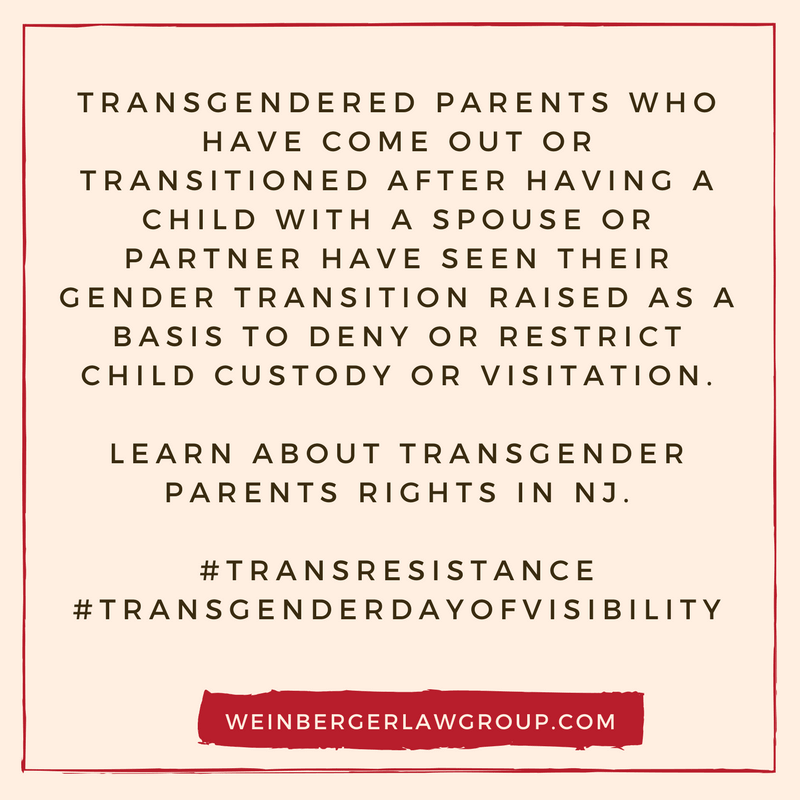The State Of Transgender Parents Rights In New Jersey
 March 31 is International Transgender Day of Visibility, an annual awareness dedicated to celebrating transgender people and to acknowledge discrimination that still occurs against the transgender community every day. As part of raising awareness, let’s take a look at the hot button issue of transgender parents and child custody rights. Are the rights of transgender parents being respected — and protected — by our laws and courts in New Jersey?
March 31 is International Transgender Day of Visibility, an annual awareness dedicated to celebrating transgender people and to acknowledge discrimination that still occurs against the transgender community every day. As part of raising awareness, let’s take a look at the hot button issue of transgender parents and child custody rights. Are the rights of transgender parents being respected — and protected — by our laws and courts in New Jersey?
Without question, we have made strides as a nation with regard to recognizing the rights of all human beings regardless of race, gender or orientation. But, we’re not fully there, yet. According to the ACLU:
“More and more transgendered parents are fighting to protect their relationships with their children in the face of custody challenges. Yet they face significant obstacles. Parents who have come out or transitioned after having a child with a spouse or partner have seen their gender transition raised as a basis to deny or restrict child custody or visitation. Transgender people who formed families after coming out or transitioning have faced challenges to their legal status as parents, often based on attacks on the validity of their marriages.”
Here in New Jersey, the standard for custody and parenting time cases is what is in the best interests of the children. All court decisions must be made with that over-arching principle at the forefront of the judge’s mind. Clearly, one’s gender identity should not be the basis of whether or not a child’s best interests are being met by having a transgender parent have custody of that child.
There are very few cases on the books across the United States that specifically discuss custodial rights of a transgender parent. And, because of this lack of case law on the books, transgender parents have been treated very differently from jurisdiction to jurisdiction. For example, in a 1973 case out of Colorado, the court found “no evidence that the environment of the transgender parent’s home…endangered the children’s physical health or impaired their emotional development.” (Christian v. Randall, 1973). In contrast, a Washington court decided, in 2007, to not give primary custody to a transgender parent because the “impact” of the parent’s planned gender reassignment surgery on the children was “unknown.”
In the Garden State, there is no specific case that discusses a transgender parent and custody or parenting time. Again, the standard the courts must look to is that of the child’s best interests. Is the child safe, happy and healthy? Are his or her needs being met, be those physical, emotional, educational, etc.? Arguing that the child of a transgender parent is clearly benefiting from having that parent in the child’s world is beyond important.
The ACLU recommends a sound plan of action for presenting such evidence of the child’s best interests including witness who can testify as to the relationship between the parent and child, testimony and/or reports from a psychologist who evaluated the family regarding the best custody or parenting time arrangements and perhaps even the testimony of the child, if the child is of a reasonable age to understand and express themselves to the judge. It is also recommended that an expert testify to educate the court and prevent the judge from relying on misunderstandings or stigmas regarding transgender people, especially if the parent’s transgender status is being used as a basis to deny custody or parenting time.
We must always ensure that the rights of all parents, regardless of gender identity, or any other reason, are always protected and that children are never robbed of the love and caring of a parent, simply because of a bias or prejudice.
If you need further information regarding transgender custody or parenting time, please contact us to schedule your initial, confidential consultation with one of our qualified and compassionate family law attorneys.
Read More:
Supporting Your Transgendered Child: What Happens When Divorced Parents Disagree?




